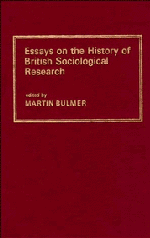Book contents
- Frontmatter
- Contents
- Preface
- Contributors
- Introduction
- History
- 2 Social monitors: population censuses as social surveys
- 3 The emergence of the sociological survey, 1887–1939
- 4 Durkheim, Booth and Yule: the non-diffusion of an intellectual innovation
- 5 The Government Social Survey
- 6 Methodological research on sample surveys: A review of developments in Britain
- 7 Mass-Observation 1937–1949
- 8 The Institute of Community Studies
- 9 Provincials and professionals: the British post-war sociologists
- 10 On the eve: a prospect in retrospect
- Use
- Index
7 - Mass-Observation 1937–1949
Published online by Cambridge University Press: 12 November 2009
- Frontmatter
- Contents
- Preface
- Contributors
- Introduction
- History
- 2 Social monitors: population censuses as social surveys
- 3 The emergence of the sociological survey, 1887–1939
- 4 Durkheim, Booth and Yule: the non-diffusion of an intellectual innovation
- 5 The Government Social Survey
- 6 Methodological research on sample surveys: A review of developments in Britain
- 7 Mass-Observation 1937–1949
- 8 The Institute of Community Studies
- 9 Provincials and professionals: the British post-war sociologists
- 10 On the eve: a prospect in retrospect
- Use
- Index
Summary
Mass-Observation was formed early in 1937 by three young men: Charles Madge, well-known as a poet but earning his bread and butter as a Fleet Street journalist; Humphrey Jennings, a lesser poet, who was learning under John Grierson, in the GPO Film Unit, the skills which would make him Britain's most distinguished documentary film director; and Tom Harrisson, self-taught ornithologist and anthropologist, a publicist – and self-publicist – of genius.
Mass-Observation was planned as an independent, scientific organisation. Its early activities had two main centres. In Bolton, Harrisson led a shifting team of full-time and part-time ‘Observers’ in a detailed study of every aspect of life in a Northern working class environment. Madge, then living at Blackheath, presided over the ‘national panel’ – hundreds of volunteers who reported on their own views, dreams, taste in clothing, daily activities and so on, in response to regular ‘directives’. Jennings' involvement was brief, but he did organise Mass-Observation's first book, May 12, a collage of reports on the Coronation of George VI in May 1937.
By 1939, the organisation was in some ways well-established, and had become a household word. Its Penguin Special, Britain, had sold well. The press took an interest in Mass-Observation's homely findings – about smoking habits, for instance, or that current dance-craze the Lambeth Walk. For some volunteer observers, ‘Mass-Observation’ had become habit forming. However, crisis was at hand. Madge and Harrisson, not dissimilar in background, were polar opposites in personality.
- Type
- Chapter
- Information
- Essays on the History of British Sociological Research , pp. 121 - 136Publisher: Cambridge University PressPrint publication year: 1985
- 19
- Cited by



